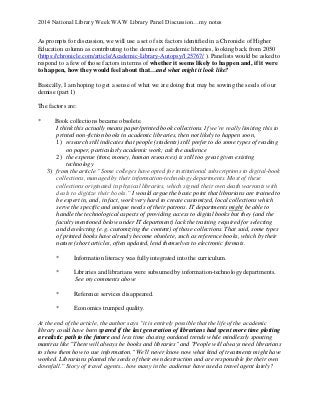2014 national library week waw panel discussion (my notes)
•Télécharger en tant que DOCX, PDF•
1 j'aime•275 vues
Signaler
Partager
Signaler
Partager

Recommandé
Recommandé
Contenu connexe
En vedette
En vedette (20)
Product Design Trends in 2024 | Teenage Engineerings

Product Design Trends in 2024 | Teenage Engineerings
How Race, Age and Gender Shape Attitudes Towards Mental Health

How Race, Age and Gender Shape Attitudes Towards Mental Health
AI Trends in Creative Operations 2024 by Artwork Flow.pdf

AI Trends in Creative Operations 2024 by Artwork Flow.pdf
Content Methodology: A Best Practices Report (Webinar)

Content Methodology: A Best Practices Report (Webinar)
How to Prepare For a Successful Job Search for 2024

How to Prepare For a Successful Job Search for 2024
Social Media Marketing Trends 2024 // The Global Indie Insights

Social Media Marketing Trends 2024 // The Global Indie Insights
Trends In Paid Search: Navigating The Digital Landscape In 2024

Trends In Paid Search: Navigating The Digital Landscape In 2024
5 Public speaking tips from TED - Visualized summary

5 Public speaking tips from TED - Visualized summary
Google's Just Not That Into You: Understanding Core Updates & Search Intent

Google's Just Not That Into You: Understanding Core Updates & Search Intent
The six step guide to practical project management

The six step guide to practical project management
Beginners Guide to TikTok for Search - Rachel Pearson - We are Tilt __ Bright...

Beginners Guide to TikTok for Search - Rachel Pearson - We are Tilt __ Bright...
2014 national library week waw panel discussion (my notes)
- 1. 2014 National Library Week WAW Library Panel Discussion…my notes As prompts for discussion, we will use a set of six factors identified in a Chronicle of Higher Education column as contributing to the demise of academic libraries, looking back from 2050 (https://chronicle.com/article/Academic-Library-Autopsy/125767/ ). Panelists would be asked to respond to a few of those factors in terms of whether it seems likely to happen and, if it were to happen, how they would feel about that…and what might it look like? Basically, I am hoping to get a sense of what we are doing that may be sowing the seeds of our demise (part 1) The factors are: * Book collections became obsolete. I think this actually means paper/printed book collections. If we’re really limiting this to printed non-fiction books in academic libraries, then not likely to happen soon, 1) research still indicates that people (students) still prefer to do some types of reading on paper, particularly academic work; ask the audience 2) the expense (time, money, human resources) is still too great given existing technology 3) from the article “Some colleges have opted for institutional subscriptions to digital-book collections, managed by their information-technology departments. Most of these collections originated in physical libraries, which signed their own death warrants with deals to digitize their books.” I would argue the basic point that librarians are trained to be expert in, and, in fact, work very hard to create customized, local collections which serve the specific and unique needs of their patrons. IT departments might be able to handle the technological aspects of providing access to digital books but they (and the faculty mentioned below under IT department) lack the training required for selecting and deselecting (e.g. customizing the content) of those collections. That said, some types of printed books have already become obsolete, such as reference books, which by their nature (short articles, often updated, lend themselves to electronic formats. * Information literacy was fully integrated into the curriculum. * Libraries and librarians were subsumed by information-technology departments. See my comments above * Reference services disappeared. * Economics trumped quality. At the end of the article, the author says “it is entirely possible that the life of the academic library could have been spared if the last generation of librarians had spent more time plotting a realistic path to the future and less time chasing outdated trends while mindlessly spouting mantras like "There will always be books and libraries" and "People will always need librarians to show them how to use information." We'll never know now what kind of treatments might have worked. Librarians planted the seeds of their own destruction and are responsible for their own downfall.” Story of travel agents…how many in the audience have used a travel agent lately?
- 2. 2014 National Library Week WAW Library Panel Discussion…my notes A second part would consist of responding to recipes posited by David Lankes from Syracuse University's iSchool for libraries moving forward in a more positive way, from The Mission of Librarians Is to Improve Society through Facilitating Knowledge Creation in Their Communities (http://www.newlibrarianship.org/wordpress/?page_id=1211) Basically, I am hoping to get a sense of what we are doing that may be sowing the seeds of our demise (part 1) and what we should be thinking of doing in order to thrive * Bad libraries build collections. * Good libraries build services. * Great libraries build communities.
